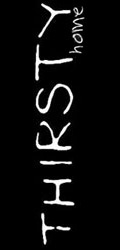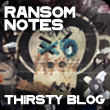

By THIRSTY
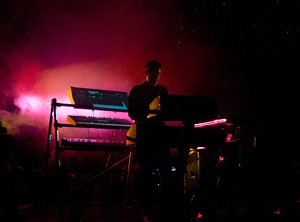
Jeffrey Koepper
The Gatherings Concert, Philadelpia
(credit: Jeff Towne)
Jeffrey Koepper has been composing, recording and performing electronic music and working with synthesizers for twenty-five years. Based on the East Coast, Koepper is a frequent performer at Philadelphia’s The Gatherings Concert Series, organized by Chuck Van Zyl, and has appeared on the Stars End Radio Show that features ambient electronic music. Koepper, a proponent of the Berlin School and known for his emotional electronic compositions, lives in Baltimore where THIRSTY had a chance to speak with him about electronic music and his work.
THIRSTY: You are known as a Berlin School composer. How did you discover the Berlin School and what appealed to you about that style of electronic music?
Jeffrey Koepper: I discovered Berlin School music when I was first discovering electronic music. I bought a cassette of Tangerine Dream’s EXIT and that was it for me. A lot of the great electronic music comes from Germany, hence the Berlin reference. Artists like Tangerine Dream, Klaus Schulze and Ashra really moved me and inspired me to pick up the synthesizer and run with it. I really love the feel and vibe of this music, and when it is done well, it definitely takes you to another place or time. I love its energy and the hypnotic quality created by the analog sequencer, which is very important in Berlin School music and is used to generate patterns, either planned or random, that can be built on and layered to create very complex, evolving rhythms. These patterns repeat and interact with each other, constantly changing and building throughout a piece. There is nothing like getting three or four Arp sequencers locked up and running against each other…amazing stuff.
I am drawn to the rhythmic nature of this music as well as to its atmospheric side…a great analog string machine passage can blow your mind. I am totally inspired to create thick and lush analog synth textures that draw the listener into a new world. The emotional nature of this style is what really attracted me to it early on. There is nothing like diving in to an incredible atmosphere within the music. You may not want to come back.
THIRSTY: What distinguishes your electronic music from other Berlin School composers?
Jeffrey Koepper: There are a number of things that distinguish my music from other composers. I come from a punk rock/DIY background and I am totally self-taught. I build and modify analog synths and I am very involved with them - inside and out. I think this attitude sets me apart from others. I write from feel and emotion, not by a learned theory. Everything for me is about creating a feeling and atmosphere. I am not concerned with the rules of music at all. The other thing that sets me apart is my work method. I use only vintage instruments to create my music - this means no computers. I use all hardware analog synths, like vintage Oberheim, Sequential Circuits, ARP, Moog, Crumar, Elka and many others. I also use vintage sequencers, effects processors and an analog mixing console to create in the studio. All hands on - everything is tactile. My studio is a complex creature, all interconnected so that anything can interact with anything else by patching it together. These patch cords are like the veins and arteries of the living beings that I create. This way of working leads you to paths that are not traveled by others these days. I really feel there is lots and lots of great music to be created this way…in 2012 and beyond.
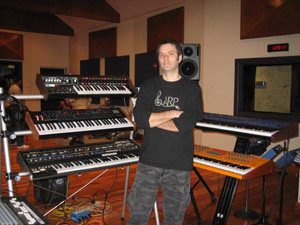
Jeffrey Koepper on Stars End Radio Show
(credit: Jeff Towne)
THIRSTY: How important are analog instruments vs. digital ones to you?
Jeffrey Koepper: For me, it's analog or nothing. I really connect with analog synthesizers on a primal level. I am inspired working with these instruments. These instruments are covered with knobs and switches that lead to a very intuitive and creative experience. I mainly use vintage analog synths from the 70's and 80's by the companies I mentioned earlier. I have a theory that I call, "Lost Arts of the Ancients." This theory says that in the past (1970’s -1980’s), companies were able to make excellent sounding, beautiful instruments that were built well, sounded incredible and a pleasure to work with. This knowledge appears to have been "lost." I feel that the instruments made now never quite reach the pinnacle achieved by these older synthesizers. The magic seems to be missing. My motto is: "Older is Better." The older analog synths have a quality that can't be sampled or copied by a computer program. These synths are full of transistors, semiconductors, capacitors, resistors, etc., and these components are responsible for the sound of the synth. Each analog synth has it's own arrangement and composition of components that gives it a unique identity. An Oberheim will sound different from a Moog that sounds different from an ARP. All have their place. Analog synthesizers have a lush, organic and unpredictable nature that can't be copied with digital technology. Companies are now trying to create computer programs to model these qualities and they fail for me because these programs are just that, a list of instructions inside a computer and not an organic, analog creation. The other problem with the digital approximations is that the modeled digital synth's controls are on a computer screen and you have to access them with mouse or some control surface to interact with them, not a very intuitive or organic experience.
THIRSTY: You have released seven albums, with Arctisonia being your most recent. How would you characterize your body of work since you became a solo artist?
Jeffrey Koepper: My body of work is constantly evolving and developing. I am always striving to bring the best work I am capable of to the world. Each of my releases is inspired by the spark of an idea or a feeling that becomes the central theme and emotion of the work. There is always a thread through all my works that has my identity stamp. By working with an older analog method that many of today's artists have abandoned, my works become more and more distanced from the current trends. This is not intentional, but just a by-product of my method. Also with each record, my analog studio grows and changes like a living being. This leads me in new directions. I always find new doorways to enter and explore for the next work. One of my goals is to share my work with the world and show what is still possible with this method of creating and producing analog music.
THIRSTY: Groups like Tangerine Dream, Klaus Schulze and Kraftwerk are well-known practitioners of the Berlin School. Where in the pantheon of emotional electronic music would you place yours?
Jeffrey Koepper: That is an interesting question. I would hope to be considered a creative and unique artist with my own voice and style. I always strive to be genuine and true to my art and never stray from that principle. I would love to be responsible for a renaissance in creating music in the analog method by showing what is possible and how it can be achieved. It would be really great to influence others to pick up an analog synth or ARP sequencer and start creating great works.
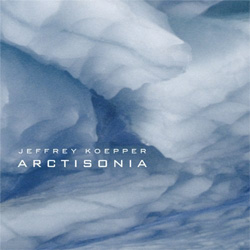
Arctisonia - Jeffrey Koepper
THIRSTY: How has Steve Roach’s work influenced your thinking and your compositions?
Jeffrey Koepper: Steve has been very important to me as a great friend as well a great artist. He is an awesome human being. His work is amazing and he always inspires me. He has an excellent work ethic and is very productive. He is truly an artist. His example leads me to be very productive and creative in my music. Steve was also instrumental in helping me to get my first solo record, Etherea, together and released. Back in 2003, I traveled out to Arizona to the Time Room to put Etherea together with Steve. He really helped me pull it all together and I am forever grateful to him for that. Steve really lets you see that anything is possible if you are true to the work and stick with it.
THIRSTY: In today’s data-driven, hyperactive society, is there still a place for ambient music and emotional sound sculptures?
Jeffrey Koepper: Sometimes, I wonder about that. I know there is still a place for great electronic music in today's world. I know that I can still sit in a darkened room to listen to a 70-minute piece of music without any other stimulation. I just melt into the sound worlds created by the music. When I am creating in the studio, I can listen to a beautiful repeating sequence or atmosphere for hours. You can always find new elements to focus on within the music, so it is always changing and developing. It seems like in our hyperactive, instant gratification society, the attention span of many has been greatly shortened. I would hope that others could still be open to the experience of just listening and absorbing the ambient sonic textures created by me, and like-minded artists. This music has a healing and sacred quality to it. It has been used as therapy to help people in many ways. I would hope that is will continue and expand. I have received lots of messages from my fans that have used my music for healing. These messages really touch me. I know that for me personally, ambient electronic music is very healing, There are certain pieces of music I can put on in dark times and they always bring me out. That is the beauty of music. It is always there for you.
Link:








